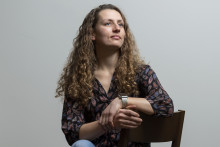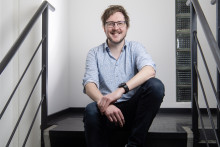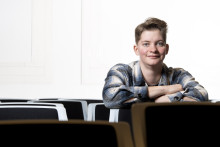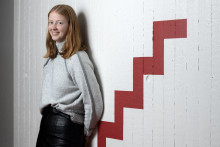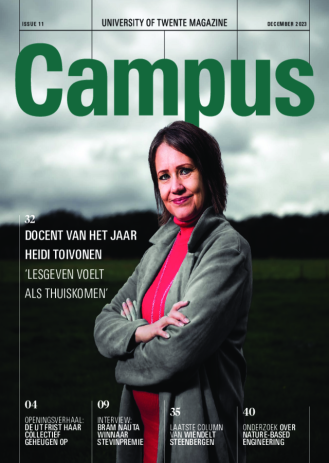‘I’m a PDEng candidate, which means I’m working towards a professional doctorate in engineering. Doing a PDEng project is quite different from a PhD. First of all, it is shorter. The PDEng lasts two years, instead of four years. It is also way more practical than a PhD. I work in a very close contact with companies. I’m really designing something and researching if it works, rather then looking into a topic in general. As a PDEng, I know what the problem is and I look for a solution and design it.
Pleun Driessen
PDEng research topic: GoPro Learning Communities project aiming to use action cameras to bridge the gap in learning between theory and practice, contributing to fast, effective and engaging skilling and upskilling
Works at: Educational Science (OWK), part of the Department of Learning, Data analytics and Technology (LDT) at the Faculty of Behavioural, Management and Social Sciences (BMS)
Studied: Learning and Development in Organisations at the University of Maastricht
Originally from: Beers, The Netherlands
I’m working on the GoPro learning communities project together with about twenty companies, mostly schools that educate construction workers. I’m studying how we can use cameras in construction education. People studying to be in construction are normally asked to evaluate their performance in writing, but that is a big hurdle for many of them. We therefore thought of using GoPro cameras to record their performance instead. The goal of my project is to deliver a new approach for students – from software needed to privacy guidelines and instructions. This project really spoke to me because it was something really new and something that would help people.’

‘I graduated from high school when I was seventeen, so I was very young. I come from a small village in the south of the Netherlands. I didn’t want to leave and be far away from home, but the more I searched for what interested me, the further I moved. I didn’t necessarily want to work in education. I wanted to be a teacher when I was really little, but that wish disappeared as I grew older. But I was fascinated by how and why people learn. I wondered why one person learns well and others don’t, why some thrive and others don’t. So I decided to focus on that. I ended up doing a double bachelor - in Educational sciences from Utrecht University and a degree for primary school teaching from the university of applied science of Utrecht. I liked studying at a university, but I really wanted to do something, not just study, so I decided to combine it with a more practical degree.
‘I thought of doing a PhD, but I wondered what impact would my PhD have’
I like the world of education, but I realized I wanted to focus more on adults, on life-long learning, rather than education of young children. I went for a Master’s degree in Learning and Development in Organisations at the University of Maastricht. During my studies, the opportunity to do a thesis within a company came up and the practical me really wanted some action, so I ended up doing my thesis in a chemical factory. I really liked the environment. It was a nice challenge. Afterwards I applied for many jobs, but I couldn’t find anything that was really exciting for me. I thought of doing a PhD, but I wondered what impact would my PhD have on the world. Then I came across a PDEng – I never heard of that before and I was excited to see how practical it was.’
WHAT IS PDENG?
- The PDEng is a practical oriented professional doctorate in engineering focused on the direct needs of industry, whereas the PhD focuses on scientific research.
- PDEng programs are tailor made, developed in consultation with companies.
- The PDEng has a duration of 2 years
- All PDEng trainees work directly with a company, which specifies their design project.
‘PDEng gives you a lot of freedom, there are no strict guidelines. That can be challenging, but it also allowed me to really make the project my own. I had to figure out how to approach it, what my role was, I had to search for my own way. Luckily I’m not the only one working on this project, we have a team of four people, so I always felt like I had a backup. Of course, I also started working during the pandemic, so it was a struggle to get to know my department.
On top of studying and working, I’ve been horseback riding since I was a child and I do it with a lot of passion. I own a horse and he was the main reason why I didn’t want to leave home in the first place. I was able to get a Top Sport arrangement here at the UT, because I do horseback riding at a high level. The arrangement is mostly for bachelor and master students, but I also needed it because as a PDEng you are both a student and an employee. I think doing sport and PDEng was the perfect combination, because you work with your head during the day and you can use your body in the evening. It keeps you in balance. I love riding. When I go to a competition, I always want to on my best. If I’m not, I need to find out why and how I could improve that next time. That is the same ambition that drives me as a PDEng.

I’m going to graduate in June, so I’m quite far along with the project. I got the opportunity to spend an extra year as a junior researcher working on this project. The project is something I’m really proud of and I want to be there from start to finish. I’m not sure what I will do after that yet. I never thought I’d want to work in academia, but here I am, enjoying it. I will go with the flow, but I think there will always need to be a practical challenge for me to work on. I get bored just sitting behind a computer.
‘Doing a PDEng is better than I expected’
Doing a PDEng is better than I expected. It is so practical and it gave me so much energy. I was able to spend a lot of time working in the companies, meeting people, trying new things. There are also so many interesting and smart people at the university. There was a lot of inspiration all around. As a PDEng you spend half of your time doing courses and the other half on your project – I really appreciate that. I've enjoyed the mix of still learning and having my own project to lead. I've felt like I was making something with real impact.’


